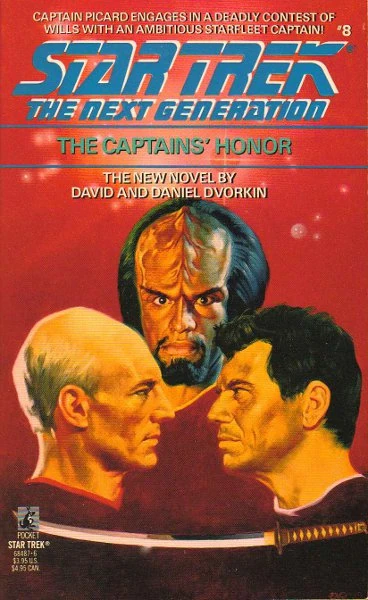TNG The Captains Honor
In “The Captain’s Honor,” the eighth novel in the Star Trek: The Next Generation series of massive paperbacks sitting in the box on my dining room floor, brother authors David and Daniel Dvorkin craft an interesting tale that pits the ideals of modern Starfleet against the Ancient Roman warrior culture of another starship crew. This novel delves into the complexities of honor and societal norms set against the backdrop of interstellar diplomacy and conflict.

Synopsis:
The USS Enterprise, boldy going under Jean Luc, is assigned a mission to potentially rescue another Federation vessel and investiage a series of attacks on the planet Tenara. Tenara is a peaceful colony being attacked by merciless cat-like creatures, the M’dok. These M’dok appear to be attacking and eating the Tenarans, alongside the typical pillaging and raping, and during one of the raids managed to piss off another Starfleet Captain, Lucius Aelius Sejanus, of the USS Centurion.
Sejanus and his crew adhere to a rigid, Romanesque code of honor and discipline, which starkly contrasts with Picard’s more diplomatic and compassionate approach. As tensions rise, the two captains must navigate their differences to find a peaceful resolution to the Tenaran conflict. But when the situation escalates into open hostility, Picard and Sejanus must confront their own beliefs and leadership styles to prevent a full-scale war.
Review:
“The Captain’s Honor” is a fascinating exploration of contrasting leadership philosophies within the Starfleet framework. David and Daniel Dvorkin present a compelling narrative that challenges readers to consider the various facets of command and what it truly means to be honorable. The primary point of moral contention being the Tenaran’s right to defense or pacificity, wrapped in the broader implication of what pacificity could mean for their species.
The novel shines in its portrayal of Captain Picard, whose diplomacy and tact are put to the test against Sejanus’ rigid and militaristic approach. Picard’s nuanced understanding of honor and duty is butts against Sejanus’ black-and-white view. To Sejanus might is right and the inability, or unwillingness, of the Tenarans to raise the mantle for defense only opens the door of opportunity for the Starfleet/Roman Empire to expand. This clash not only drives the plot but also provides a deeper insight into Picard’s character, showcasing his strength and integrity as a leader who values the broader sociological implications placing Starfleet ideals would have.
The Tenaran conflict serves as an effective backdrop for this character study, with the political and cultural complexities of the planet adding layers of intrigue to the story. The authors handle the world-building with care, presenting Tenara as a living, breathing entity with its own history and traditions. The father daughter relationship drives much of the native subplots, with Riker hamming it up in typical daughter-Riker fashion, and the broader ideal of a society so ingrained in peace that the mere thought of violence, even in defense, is an interesting concept that the authors do a great job of allowing to thematically play out in various natural conflicts.
Perhaps the most interesting thread pulled throught the story are the machincations of Sejanus’ cousin in command, Marcus Volcinius. Marcus works through the novel in a Goebbels like fashion to reeducate the peaceful people of Tenara away from their idealistic existence and onto the road of war. At first these movements appear to be outside of Captain Sejanus’ knowledge, however it culminates with Sejanus murdering one of his own commanders, almost stealing the Enterprise’s prefix code, and escaping custody all the while on the way to a cliff hanger ending.
I’m uncertain if there are any further Romanic adventures for Jean-Luc and co, apparently this novel was inspired by a ToS episode so perhaps I should check it out, but I will say this was an enjoyable read. Despite intentionally skipping my freshman Latin finals I have always enjoyed Greco-Roman history so more within the ST universe would not be a bad thing. Two heads are better than one with this novel, because of the two authors, getit?